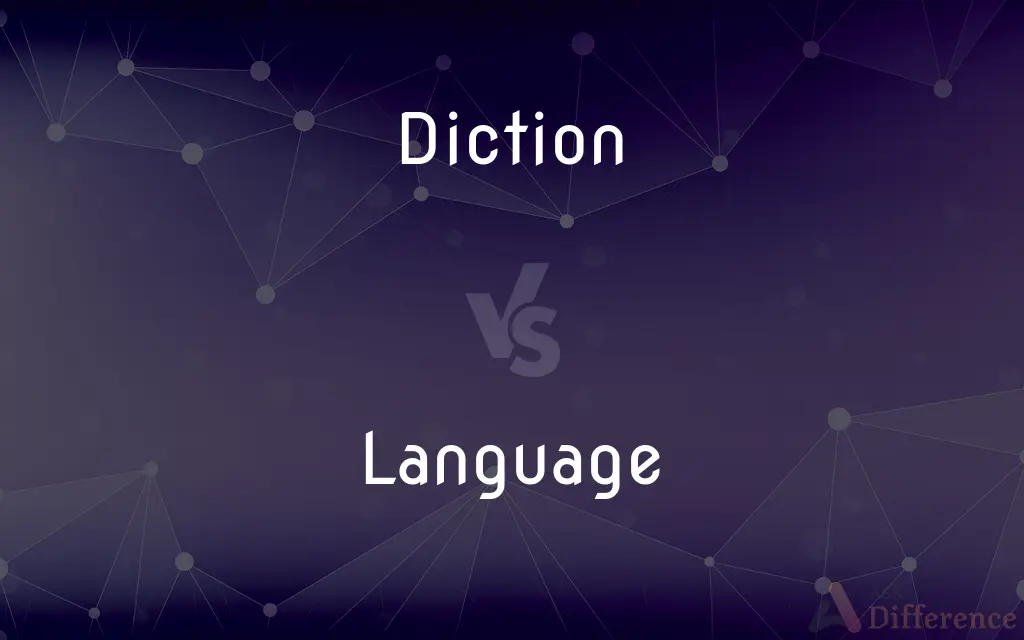Diction vs. Language — What's the Difference?
Edited by Tayyaba Rehman — By Fiza Rafique — Updated on March 11, 2024
Diction refers to the choice and use of words and phrases in speech or writing, highlighting style and clarity, whereas language is a system of communication used by a particular community or country, encompassing vocabulary, grammar, and pronunciation.

Difference Between Diction and Language
Table of Contents
ADVERTISEMENT
Key Differences
Diction is concerned with the selection of specific words and phrases that a speaker or writer chooses to convey a message. It plays a crucial role in determining the tone, style, and clarity of the communication, affecting how the audience perceives and understands the content. In contrast, language is a broader concept that includes not only vocabulary but also the rules of grammar, syntax, and pronunciation that govern how words are used to form meaningful sentences and express ideas.
While diction is a component of language, focusing specifically on word choice within a given language, language itself is the foundation upon which diction builds. Language provides the structure and the toolkit from which diction can draw, including the nuances of meaning, connotation, and denotation that words carry. On the other hand, language is the medium through which all communication takes place, encompassing a wide array of expressions, from spoken and written forms to non-verbal cues and sign languages.
The effectiveness of diction is often measured by how well it matches the purpose of the communication and resonates with the intended audience. For example, the diction used in a scientific research paper would differ significantly from that in a novel or a casual conversation. Language, however, is more about the capacity for communication within a particular linguistic community. It evolves over time, influenced by social, cultural, historical, and technological factors, and serves as a vehicle for cultural identity and expression.
Diction can also reveal much about the speaker or writer's background, education, and attitudes, as the words chosen can reflect levels of formality, regional dialects, or specialized knowledge. Language, in its turn, reflects the broader cultural and social contexts in which it is used, embodying the history, traditions, and values of the people who speak it. The richness of a language, with its idioms, expressions, and variations, provides a vast palette from which diction can draw to create effective and engaging communication.
Understanding the relationship between diction and language is essential for effective communication. While diction is an element of style and expression within the framework of a language, mastering a language involves not only knowing its vocabulary and grammar but also understanding the cultural and contextual nuances that influence how it is used in different settings.
ADVERTISEMENT
Comparison Chart
Definition
Choice and use of words in speech or writing
System of communication with vocabulary, grammar, pronunciation
Focus
Word choice to convey tone, style, clarity
Rules and structure for communication
Scope
Part of language focusing on expression
Broad system encompassing all aspects of communication
Purpose
To match communication with context and audience
To enable communication within a community
Reflection
Shows speaker/writer's mastery and intent
Reflects cultural, social, historical context
Compare with Definitions
Diction
Tailored to fit the audience and purpose.
The teacher used simple diction to ensure all students could understand.
Language
A structured system for verbal and written expression.
The study of language encompasses grammar, vocabulary, and syntax.
Diction
The choice of words to convey specific meanings.
The author's diction included many archaic terms to evoke a historical setting.
Language
Reflects the traditions and identity of a community.
The revival of indigenous languages is crucial for preserving cultural heritage.
Diction
Affects the tone and style of the communication.
The politician's formal diction conveyed seriousness and authority.
Language
Adapts and evolves over time with society.
Technological advancements have introduced new terms into our language.
Diction
Reflects the speaker's or writer's personality and background.
The poet's diction was rich with nature imagery, reflecting her love for the outdoors.
Language
Encompasses a wide range of dialects and registers.
The language spoken in rural areas may differ markedly from urban dialects.
Diction
Aims for clear and effective communication.
The lawyer's precise diction helped clarify complex legal concepts.
Language
Serves as the medium for literature, art, and science.
Language allows for the rich expression of ideas, emotions, and discoveries.
Diction
The effectiveness and degree of clarity of word choice and expression.
His poor diction meant that most of the audience didn't really understand the key points of the presentation.
Language
Such a system as used by a nation, people, or other distinct community; often contrasted with dialect.
Diction
Diction (Latin: dictionem (nom. dictio), "a saying, expression, word"), in its original meaning, is a writer's or speaker's distinctive vocabulary choices and style of expression in a poem or story.
Language
A language is a structured system of communication used by humans, based on speech and gesture (spoken language), sign, or often writing. The structure of language is its grammar and the free components are its vocabulary.
Diction
Choice and use of words in speech or writing.
Language
Communication of thoughts and feelings through a system of arbitrary signals, such as voice sounds, gestures, or written symbols.
Diction
Degree of clarity and distinctness of pronunciation in speech or singing; enunciation.
Language
Such a system including its rules for combining its components, such as words.
Diction
Choice and use of words, especially with regard to effective communication.
Language
A system of signs, symbols, gestures, or rules used in communicating
The language of algebra.
Diction
(theatre) Enunciation, pronunciation.
Language
(Computers) A system of symbols and rules used for communication with or between computers.
Diction
Choice of words for the expression of ideas; the construction, disposition, and application of words in discourse, with regard to clearness, accuracy, variety, etc.; mode of expression; language; as, the diction of Chaucer's poems.
His diction blazes up into a sudden explosion of prophetic grandeur.
Language
Body language; kinesics.
Diction
The articulation of speech regarded from the point of view of its intelligibility to the audience
Language
The special vocabulary and usages of a scientific, professional, or other group
"his total mastery of screen language—camera placement, editing—and his handling of actors" (Jack Kroll).
Diction
The manner in which something is expressed in words;
Use concise military verbiage
Language
A characteristic style of speech or writing
Shakespearean language.
Language
A particular manner of expression
Profane language.
Persuasive language.
Language
The manner or means of communication between living creatures other than humans
The language of dolphins.
Language
Verbal communication as a subject of study.
Language
The wording of a legal document or statute as distinct from the spirit.
Language
(countable) A body of words, and set of methods of combining them (called a grammar), understood by a community and used as a form of communication.
The English language and the German language are related.
Deaf and mute people communicate using languages like ASL.
Language
(uncountable) The ability to communicate using words.
The gift of language
Language
(uncountable) A sublanguage: the slang of a particular community or jargon of a particular specialist field.
Legal language;
The language of chemistry
Language
The expression of thought (the communication of meaning) in a specified way; that which communicates something, as language does.
Body language;
The language of the eyes
Language
A body of sounds, signs and/or signals by which animals communicate, and by which plants are sometimes also thought to communicate.
Language
A computer language; a machine language.
Language
(uncountable) Manner of expression.
Language
(uncountable) The particular words used in a speech or a passage of text.
The language used in the law does not permit any other interpretation.
The language he used to talk to me was obscene.
Language
(uncountable) Profanity.
Language
A languet, a flat plate in or below the flue pipe of an organ.
Language
To communicate by language; to express in language.
Language
An admonishment said in response to vulgar language.
Language
Any means of conveying or communicating ideas;
Language
The expression of ideas by writing, or any other instrumentality.
Language
The forms of speech, or the methods of expressing ideas, peculiar to a particular nation.
Language
The characteristic mode of arranging words, peculiar to an individual speaker or writer; manner of expression; style.
Others for language all their care express.
Language
The inarticulate sounds by which animals inferior to man express their feelings or their wants.
Language
The suggestion, by objects, actions, or conditions, of ideas associated therewith; as, the language of flowers.
There was . . . language in their very gesture.
Language
The vocabulary and phraseology belonging to an art or department of knowledge; as, medical language; the language of chemistry or theology.
Language
A race, as distinguished by its speech.
All the people, the nations, and the languages, fell down and worshiped the golden image.
Language
Any system of symbols created for the purpose of communicating ideas, emotions, commands, etc., between sentient agents.
Language
Any set of symbols and the rules for combining them which are used to specify to a computer the actions that it is to take; also referred to as a computer lanugage or programming language; as, JAVA is a new and flexible high-level language which has achieved popularity very rapidly.
Language
To communicate by language; to express in language.
Others were languaged in such doubtful expressions that they have a double sense.
Language
A systematic means of communicating by the use of sounds or conventional symbols;
He taught foreign languages
The language introduced is standard throughout the text
The speed with which a program can be executed depends on the language in which it is written
Language
(language) communication by word of mouth;
His speech was garbled
He uttered harsh language
He recorded the spoken language of the streets
Language
A system of words used in a particular discipline;
Legal terminology
The language of sociology
Language
The cognitive processes involved in producing and understanding linguistic communication;
He didn't have the language to express his feelings
Language
The mental faculty or power of vocal communication;
Language sets homo sapiens apart from all other animals
Language
The text of a popular song or musical-comedy number;
His compositions always started with the lyrics
He wrote both words and music
The song uses colloquial language
Common Curiosities
What role does diction play in literature?
In literature, diction is crucial for creating atmosphere, character, and style, contributing to the work's overall impact and meaning.
Why is language considered a cultural aspect?
Language embodies the history, traditions, and values of a community, making it a fundamental aspect of cultural identity.
How do changes in society affect language?
Language evolves with societal changes, adapting to new ideas, technologies, and cultural influences.
Why is it important to study language structure?
Studying language structure helps in understanding how language functions, enabling more effective communication and language learning.
How does diction affect communication?
Diction affects the clarity, tone, and style of communication, influencing how the message is received and understood.
Can the same language have different diction?
Yes, the diction can vary widely within the same language depending on the context, purpose, and audience.
Is language only about spoken and written words?
No, language includes non-verbal communication, sign languages, and other forms of expression beyond spoken and written words.
How can one improve their diction in a foreign language?
Practice, exposure to diverse contexts, and understanding the nuances of tone and style can improve diction in a foreign language.
Does digital communication affect diction?
Yes, digital communication introduces new forms of diction, including abbreviations, emojis, and informal language, influencing how messages are crafted and understood.
Can two people speaking the same language have communication barriers?
Yes, differences in dialect, jargon, or levels of formality can create communication barriers even within the same language.
How does one choose the right diction for a specific audience?
Understanding the audience's background, expectations, and the context of the communication helps in choosing appropriate diction.
Can diction reflect social and economic status?
Yes, diction can reflect an individual's education, social background, and economic status, often influencing perceptions and interactions.
Share Your Discovery

Previous Comparison
Huckleberry vs. Marionberry
Next Comparison
Bold vs. BluntAuthor Spotlight
Written by
Fiza RafiqueFiza Rafique is a skilled content writer at AskDifference.com, where she meticulously refines and enhances written pieces. Drawing from her vast editorial expertise, Fiza ensures clarity, accuracy, and precision in every article. Passionate about language, she continually seeks to elevate the quality of content for readers worldwide.
Edited by
Tayyaba RehmanTayyaba Rehman is a distinguished writer, currently serving as a primary contributor to askdifference.com. As a researcher in semantics and etymology, Tayyaba's passion for the complexity of languages and their distinctions has found a perfect home on the platform. Tayyaba delves into the intricacies of language, distinguishing between commonly confused words and phrases, thereby providing clarity for readers worldwide.















































